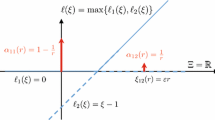Abstract
The authors analyze a stochastic programming problem where the random factor is a stationary ergodic sequence. The problem is approximated by minimizing an empirical function. It is proved that, under some conditions, the probability of large deviations of empirical estimates from the initial problem solution decreases exponentially.
Similar content being viewed by others
REFERENCES
P. S. Knopov and E. I. Kasitskaya, “The least-moduli method in discrete-time identification models,” Kibern. Vych. Tekhn., Diskr. Sist. Upr., Interdisciplinary Scientific Collection of Papers, Inst. Cybern. NAS Ukr., Issue 101, 80-86, Naukova Dumka, Kiev (1994).
Yu. M. Kaniovski, A. J. King, and R. J.-B. Wets, “Probabilistic bounds (via large deviations) for the solutions of stochastic programming problems,” Ann. Oper. Res., 56, 189-208 (1995).
J.-D. Deuschel and D.W. Stroock, Large Deviations, Academic Press, Inc., Boston (1989).
N. Dunford and J. Schwartz, Linear Operators. Pt. I: General Theory, Interscience, New York (1957).
Author information
Authors and Affiliations
Rights and permissions
About this article
Cite this article
Knopov, P.S., Kasitskaya, E.I. Large Deviations of Empirical Estimates in Stochastic Programming Problems. Cybernetics and Systems Analysis 40, 510–516 (2004). https://doi.org/10.1023/B:CASA.0000047872.23833.35
Issue Date:
DOI: https://doi.org/10.1023/B:CASA.0000047872.23833.35




